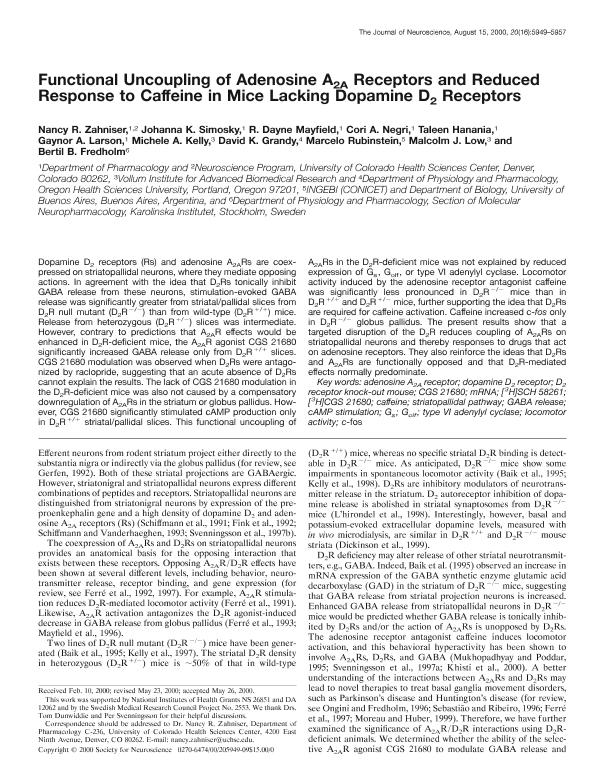Artículo
Functional Uncoupling of Adenosine A 2A Receptors and Reduced Response to Caffeine in Mice Lacking Dopamine D 2 Receptors
Zahniser, Nancy R.; Simosky, Johanna K.; Mayfield, R. Dayne; Negri, Cori A.; Hanania, Taleen; Larson, Gaynor A.; Kelly, Michele A.; Grandy, David K.; Rubinstein, Marcelo ; Low, Malcolm J.; Fredholm, Bertil B.
; Low, Malcolm J.; Fredholm, Bertil B.
 ; Low, Malcolm J.; Fredholm, Bertil B.
; Low, Malcolm J.; Fredholm, Bertil B.
Fecha de publicación:
08/2000
Editorial:
Society for Neuroscience
Revista:
Journal of Neuroscience
ISSN:
0270-6474
Idioma:
Inglés
Tipo de recurso:
Artículo publicado
Clasificación temática:
Resumen
Dopamine D(2) receptors (Rs) and adenosine A(2A)Rs are coexpressed on striatopallidal neurons, where they mediate opposing actions. In agreement with the idea that D(2)Rs tonically inhibit GABA release from these neurons, stimulation-evoked GABA release was significantly greater from striatal/pallidal slices from D(2)R null mutant (D(2)R(-/-)) than from wild-type (D(2)R(+/+)) mice. Release from heterozygous (D(2)R(+/-)) slices was intermediate. However, contrary to predictions that A(2A)R effects would be enhanced in D(2)R-deficient mice, the A(2A)R agonist CGS 21680 significantly increased GABA release only from D(2)R(+/+) slices. CGS 21680 modulation was observed when D(2)Rs were antagonized by raclopride, suggesting that an acute absence of D(2)Rs cannot explain the results. The lack of CGS 21680 modulation in the D(2)R-deficient mice was also not caused by a compensatory downregulation of A(2A)Rs in the striatum or globus pallidus. However, CGS 21680 significantly stimulated cAMP production only in D(2)R(+/+) striatal/pallidal slices. This functional uncoupling of A(2A)Rs in the D(2)R-deficient mice was not explained by reduced expression of G(s), G(olf), or type VI adenylyl cyclase. Locomotor activity induced by the adenosine receptor antagonist caffeine was significantly less pronounced in D(2)R(-/-) mice than in D(2)R(+/+) and D(2)R(+/-) mice, further supporting the idea that D(2)Rs are required for caffeine activation. Caffeine increased c-fos only in D(2)R(-/-) globus pallidus. The present results show that a targeted disruption of the D(2)R reduces coupling of A(2A)Rs on striatopallidal neurons and thereby responses to drugs that act on adenosine receptors. They also reinforce the ideas that D(2)Rs and A(2A)Rs are functionally opposed and that D(2)R-mediated effects normally predominate.
Palabras clave:
Dopamina
,
Adenosina
,
Mrna
,
Cafeína
,
Actividad Locomotora
Archivos asociados
Licencia
Identificadores
Colecciones
Articulos(INGEBI)
Articulos de INST.DE INVEST.EN ING.GENETICA Y BIOL.MOLECULAR "DR. HECTOR N TORRES"
Articulos de INST.DE INVEST.EN ING.GENETICA Y BIOL.MOLECULAR "DR. HECTOR N TORRES"
Citación
Zahniser, Nancy R.; Simosky, Johanna K.; Mayfield, R. Dayne; Negri, Cori A.; Hanania, Taleen; et al.; Functional Uncoupling of Adenosine A 2A Receptors and Reduced Response to Caffeine in Mice Lacking Dopamine D 2 Receptors; Society for Neuroscience; Journal of Neuroscience; 20; 16; 8-2000; 5949-5957
Compartir
Altmétricas



